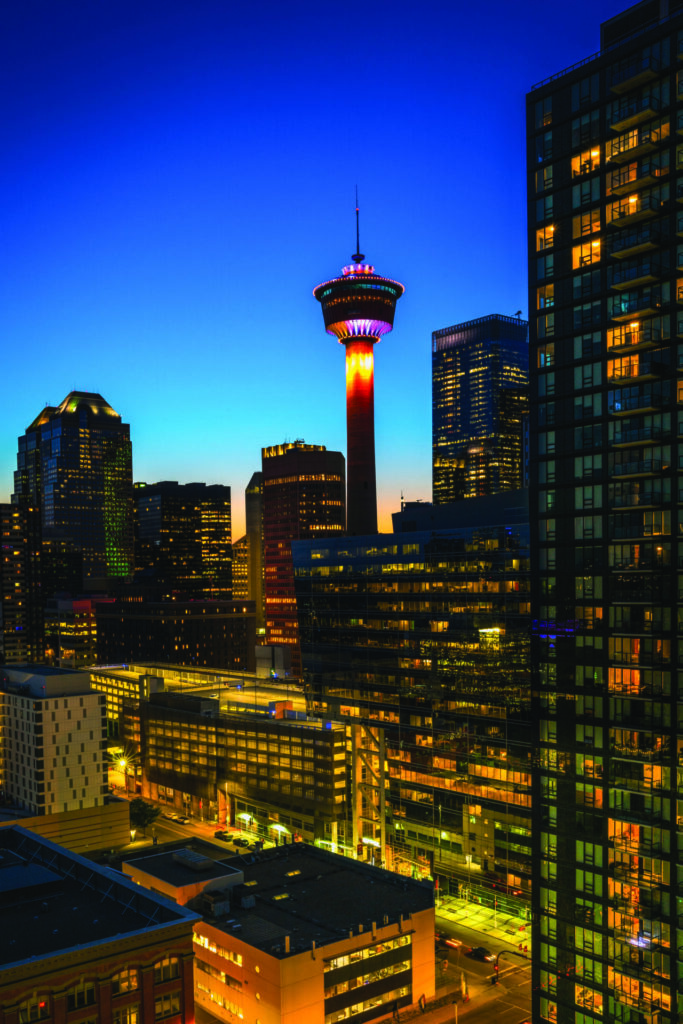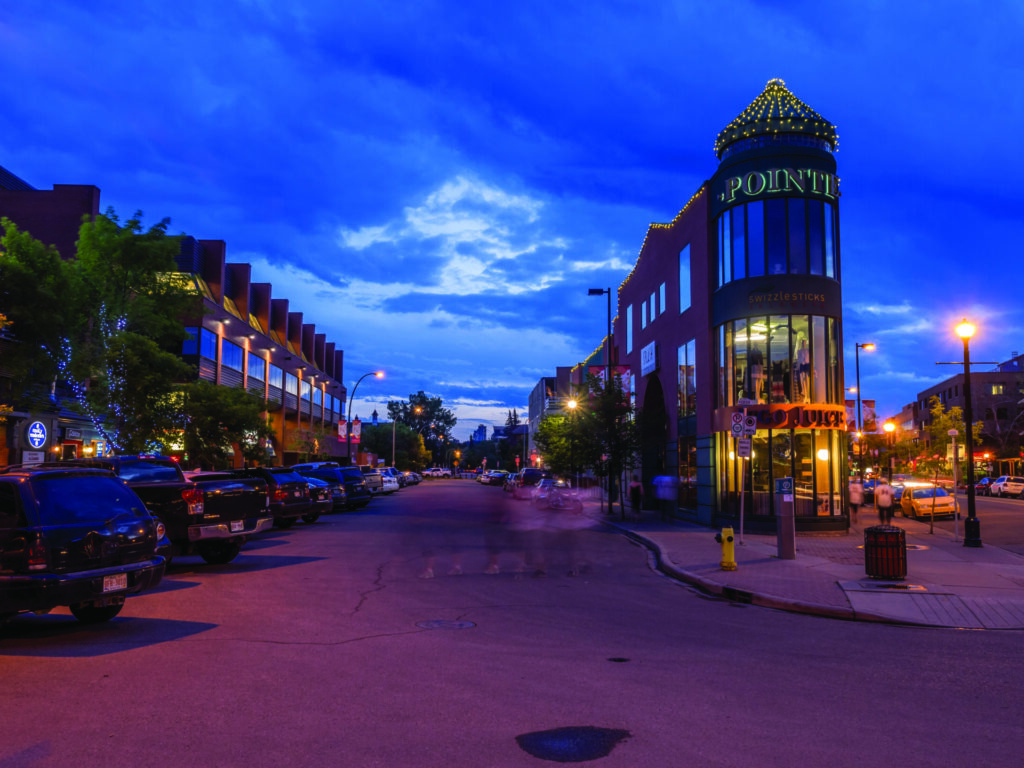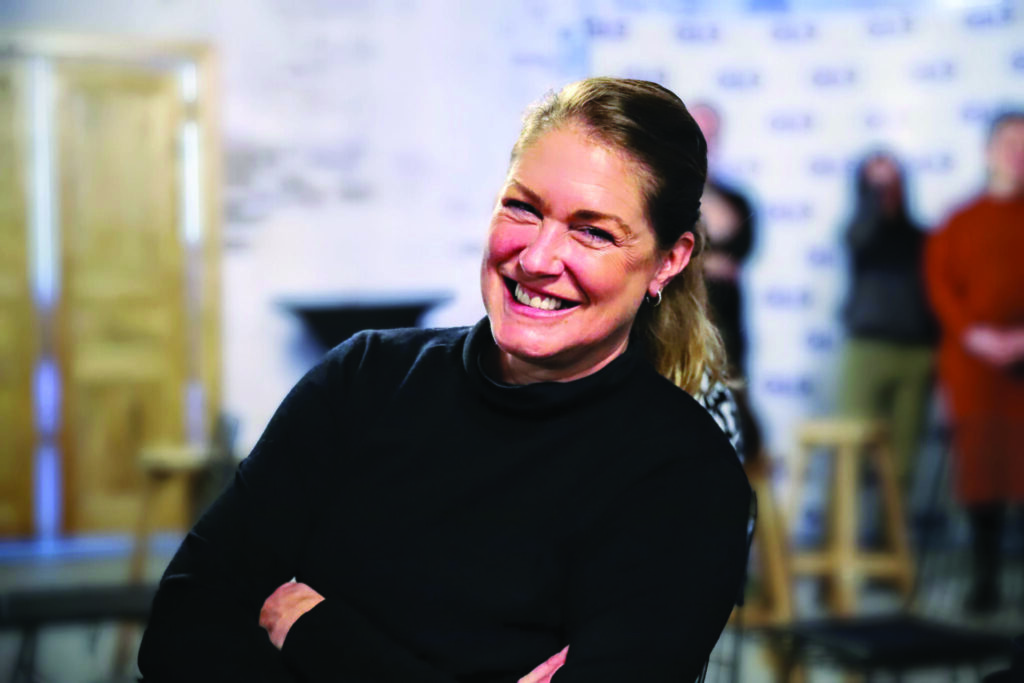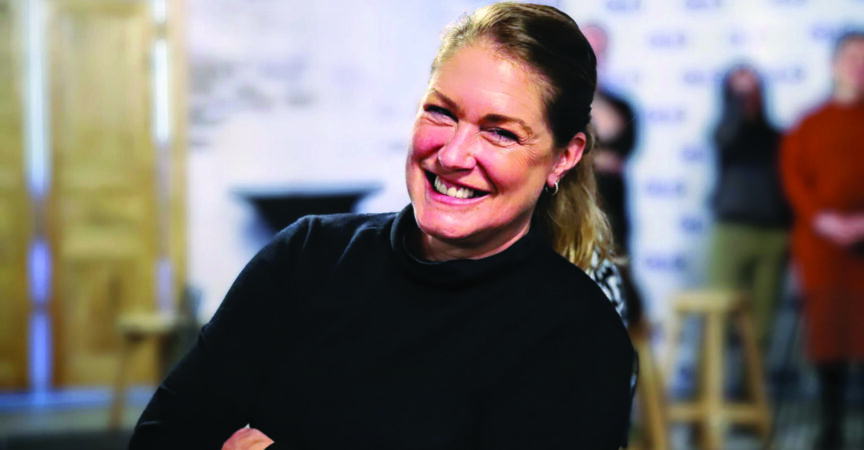The Conversation with: Arlene Stein

Arlene Stein is the founder and Executive Director of the Terroir Symposium, a catalyst for creative collaboration and social and environmental responsibility in the hospitality industry. Since 2006, Terroir has convened international and Canadian industry leaders annually at a two-day event, first in Toronto, Ontario and now in Calgary, Alberta.
From her current home base in Berlin, Germany, Arlene travels globally to research responsible food systems and gastronomic innovations. MENU connected with Arlene to talk about Terroir, the Calgary restaurant scene, the future of hospitality and Polish milk bars.
MM: A couple of years ago, you rehomed the very popular Terroir Symposium in Calgary. What led up to that and how has it been?
Arlene Stein: During the pandemic, our Ontario partner decided they didn’t want to continue with virtual events and wanted to focus on their own initiative, so we parted ways. Because I live in Berlin, I need an on-the-ground Canadian partner for Terroir to succeed. I had been in conversation with Food Tourism Strategies in Calgary for a number of years about the potential to bring the symposium to Calgary through the Alberta Culinary Alliance, which didn’t transpire. During the pandemic we reignited that conversation and we were really confident we could make something successful with their passion and commitment. They’re two brilliant women, Tannis Baker and Rheannon Green, working in culinary tourism development in Calgary who want to shine a spotlight on the city and the calibre of the culinary professionals who work there. We have a great partnership. We just finished our second year and are moving into planning our third. There are two of us at Terroir and two of them at Food Tourism Strategies and the combination has been kind of magical.
MM: Was there a reason you focused on Calgary in particular?
AS: It could have been anywhere – we were even talking to people in Chicago. What we needed was a partner with the capacity, passion and infrastructure to actually pull off a symposium for six or seven hundred people. We had a longstanding relationship with Tannis and Rheannon, and they work across a variety of culinary programming and specifically have experience with culinary tourism, which is a sort of tertiary agenda to what we do in Terroir.
MM: Has the vision for Terroir evolved over the years?
AS: Terroir is built on a legacy of community building and connecting people for the benefit of our industry. It’s about business development at its core. Education, inspiration, community development and business development – those are its pillars and that’s how we’ve always maintained it as a symposium. The content thematics change from year to year, but the pillars are constant. We evolve based on what’s going on in the industry, but we’re planning minimum of 12 to 18 months out, so we’ve got to predict the future and imagine what’s likely to be affecting people at the time we will actually deliver the symposium. Pre-pandemic that forecasting exercise was much easier. Post-pandemic it feels a little bit like standing on shattered ice, which is how I can best describe our industry right now.
MM: Do you find there’s some benefit of that precarity in terms of Terroir attendance in terms of people actively seeking community, business development and insight?
AS: I think the biggest benefit of the times we’re in is that a lot of professionals are more open and flexible in terms of how they prescribe to things. There’s no “institution” anymore, if that makes sense. It’s an open field and people are more willing to take chances and get involved. That said, the flip side is that there’s no clear leadership anymore; there’s no clear superhero anymore. That’s devolved.
Young people have taken up a space that they’re not willing to concede to us old folks anymore. They’re just owning it, and they’re really creating boundaries and determining how they will and will not engage with this industry. I would add “youth” to the list of priorities for this industry, alongside women in leadership, diversity, equity and inclusion and mental health. My older daughter works at a fine dining restaurant in Berlin, and I can tell you that she’s fundamentally more secure in her position than I was, ever, until I was well into my 30s. She’s not willing to compromise. We, as older people, had to concede to everyone, didn’t we? I wish I had had that courage.
But we taught these young professionals to set boundaries and respect themselves in the workplace; they didn’t learn that on their own. We deserve at least a small pat on the back for that.
MM: So, if the institution is in pieces on the floor, are we trying to rebuild it the same way or create something new that works better for the people who will run it? What moment do you think we’re at and what’s the opportunity for the future?
AS: I think the beautiful thing that exists in the younger generation is the passion to really commit to this industry. Our generation really didn’t. We were moving through this space because we were going to be something “better” – an artist, a dancer, a lawyer, a singer, a writer. Young people have really leaned into the industry. They love food, they love drink, they love the experience of hospitality. There’s an engaged community, we just have to figure out how to meet them in their space and treat them well so we can retain them. The biggest disappointment for me, in terms of lessons we didn’t learn through COVID, is this labour issue. We went into the pandemic with a massive labour issue because no one wanted to work in hospitality, and we had too many places. No one was willing to concede that we needed to pay more and treat people better. Then we went through three years of the pandemic, and everyone was like, “F*** this industry. We need to be treated better, and paid better and, you know what? This job is detrimental to my mental health.” Many owners took a woe-is-me kind of attitude and in my opinion, we haven’t learned our lesson. We have this captive audience of people who are super passionate and really engaged. All you need to do is work out a business model where you can pay them fair wages and treat them like human beings, and you’ll keep them. You’ll keep them in this business, and you will thrive.
AS: Restaurants are not going to go away; they’re just going to shift to reflect our current economic status and our ability to provide. People don’t have as much disposable income and they’ve had a really crappy few years, but restaurants have always been the foundation of community. People want to go out to eat. They want to celebrate, do something a little bougie or they just don’t want to cook. I’m leaning into the idea right now, which isn’t mine, that people want to experience “fun dining, affordably”. That doesn’t mean going out to McDonald’s, it means going out to middle-range restaurants where they can get the biggest bang for their buck. People don’t want to spend huge amounts of money on multi-course tasting menus. Those experiences are being definitively pushed into the realm of the elite and only the elite. People don’t have the money, nor do they want to be bound by that experience. They want to be able to take whatever disposable income they have and spread it as far as they can, going to cheaper, easier and more fun establishments. What people really want is conviviality – being entertained and eating and drinking good food with friends.

MM: So, you have faith in the core purpose of hospitality.
AS: Absolutely! People aren’t going to stop wanting to go out, it’s how we create sociability. In Calgary, food writer Christine Sismondo was talking about the bar space and about how we have to have a “third space” in our lives. It was brilliant. It’s the idea that you have home, you have work and then you need a third space. What cocktail culture and bar space allows is a third space of community or gathering. You can have this space virtually anywhere, but most of us do it in a bar or restaurant environment. It’s not fine dining. And no one’s giving that up or we’d all be stuck at home. We need that space.
MM: It’s your Local. It has a low barrier to entry, it’s familiar, comfortable and fits into your neighbourhood routine.
AS: We had a place in Toronto we used to go to before we moved, and it was a mediocre pub, but we loved it. It was down the street, and we knew everybody there. The food was decent and reasonably priced. I think we’re going back to that.
MM: So, what about Calgary? There’s a lot going on in terms of economic and social development. How has that affected the local restaurant scene?
AS: It’s been a very interesting experience to work in Alberta and realize how different we are from province to province. I kind of love it. Albertans are hugely devoted to their province and to each other. People are super supportive and community-oriented, and they have money to spend.
Calgary is very wealthy, and has a laid-back, down-home culture where they’re less afraid to spend money than other provinces. It may be a smaller population than Toronto or Vancouver, but you have a lot more people going out to very affluent places than other cities.
We work with JP Pedhirney from the Concorde Group, and I think about them in comparison with Oliver & Bonacini. Every one of their properties is really delivering. They’re really unique, they give people an exceptional experience and value for money. They’re the quintessential of what Calgary and Alberta hospitality is all about. They’re world class. Connie DeSouza and John Jackson from CHARCUT and charbar have really elevated Alberta and their experiences are on par as well as accessible. What Alberta is doing that many other provinces are not is delivering these world-class experiences and products in a very accessible, open and down-home way.
MM: How has the move to Calgary changed Terroir?
AS: We’ve shifted to embrace the Alberta community. We’re highlighting their environment and what’s going on in their professional world. One of the things I didn’t know before the first Terroir in Calgary is how committed they are to their Indigenous community and that comes through in our content and the people we connect with. There are so many opportunities to connect with Cultural Carriers or people who do herbal remedies, teas, Indigenous arts. In Ontario, we had to really pull to bring Indigenous culinary into the consciousness of the hospitality community, but in Calgary it’s part of the fabric of who they are.
Calgary is a smaller, more accessible community, which has made planning a little easier. When I bring people in from international locations, Calgary and the surrounding regions offer more of a surprise because they’re not familiar. They don’t know it’s the plains, they don’t know it’s on the edge of the Rocky Mountains, so for our international guests, it’s more curious and unusual.
MM: What are the most pressing challenges and concerns for Calgary operators?
AS: They’re impacted by all the same things the rest of us are in hospitality, but one of the biggest local challenges is recruitment. With that comes questions of whether they can pay enough and keep people interested enough to stay in the industry as well as whether they need to look at the impact of this industry on people’s wellbeing. Because Calgary is wealthy, the mental health aspect may not be as significant as cities like Toronto that also have out-of-control living costs.
I’ve been back to Canada once a year for the last three years because of the pandemic. Every year I come back, the rise in your prices is staggering, and it gets increasingly worse. In Toronto, people seem to be experiencing more of a crisis. In Calgary, people seem to be more accepting of the cost of things.
MM: Are you seeing an evolution in ownership and leadership roles in Calgary?
AS: Definitely. Chef Liana Robberecht works at Trico Living Well, and she does so much to convene the women in that space. She’s a powerhouse and has been instrumental in helping Terroir succeed. Sal Howell, who owns River Cafe is an institution there and she’s not even from Canada; she’s from England. She has a great story about how she travelled around the world and when she got to Calgary, she just fell in love with it. She loves that community and has done everything she can to invest in the Terroir space, the community. Connie DeSouza and John Jackson again come to mind. They’re such a driven couple who have really helped shine a light on Calgary – not just on the work they do, but on people they’ve managed to drag into that community. I also only just met Chef Nicole Gomez this year, and she’s doing Cluck and Cleaver. She’s fascinating. She did Top Chef Canada and her goal with that was to bring visibility and an identity to the Calgary scene, but to also create an equitable business model for herself in her fried chicken business.
There’s a significant Mexican community in Calgary, which may come as a surprise to some. Chef Elia Herrera has opened up a stunningly beautiful Mexican restaurant called Milpa. It’s something that could be in New York City. It’s of that calibre. We went to her restaurant for dinner, and it blew my mind.
MM: The theme for this year’s Terroir Symposium was Transformation. What do you think the future of the industry looks like; what would you like to see?
AS: I would like to see more people invested in the traditional disciplines attached to hospitality – bakery, butchery, cheese making – more of the artisanal production methods that surround restaurants and could even be incorporated into restaurants. I see these things as playing a role in the future development potential of the industry.
I would like to see restaurants become more democratized; even more so than now. My favourite thing when I moved to Europe was when I went to Poland and discovered the “milk bar” concept. It’s an institution that was developed by the Communist government to provide healthy, nutritious meals to workers during the day. It was built on a system of social responsibility, so the workers were paid fair, living wages by the government and food was provided to milk bar consumers at a super-cheap cost. It’s a little like the canteen model, and they still exist. It’s such a thoughtful, beautiful model. We don’t have that in North America; we have food malls and food courts. This idea that food is part of the structure of society and that restaurants should be able to create and convene community and provide delicious, healthy meals for people at a sensible cost would be the way I would like to see things move forward.

Instagram: @arlenestein terroirtalk.org
Stay tuned for details on upcoming events and Terroir 2024!
Visit terroirsymposium.com and sign up for their newsletter.
Follow on Instagram: @terroirsymposium










